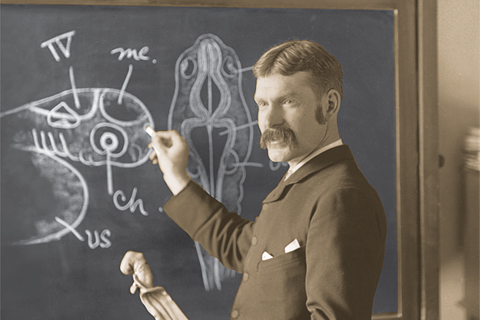One of the intriguing people mentioned in Arts & Science at Toronto: A History, 1827–1990 comes from author Craig Brown’s own department of history. “I came to U of T to do a master’s degree in 1957. One of my professors was Donald McDougall, who was blinded at the Somme, in 1916,” says Brown, a professor emeritus who has also served as vice-dean of the Faculty of Arts and Science. “He took a course at Hart House to learn massage – a program that had been set up to help wounded soldiers carry on after the war.”
McDougall started taking history classes on the side, and eventually became a professor in 1929. Three decades later, “I used to read to him, every week,” says Brown. “Mostly new books and monographs in his specialization, early modern British constitutional history. He was a great man.”
Intriguing characters such as McDougall populate the pages of the book. Brown tells the story of John McLennan, chair of physics, whose stay in England to develop anti-submarine mines – with a 12-person staff – from 1917 to 1919 was fully funded by the university. During the Second World War, Prof. Elizabeth Allin of physics taught 500 would-be radio technicians at the university. Forty years later, when Arts and Science chairs refused to co-operate with budget cuts, President James Ham called the faculty an “ungovernable collection of barons and thieves.”
Brown was inspired by Martin Friedland’s book The University of Toronto: A History, which was just released in a second edition in paperback, with a new 40-page introduction summarizing the events of 2000–2012. “Because Marty’s book had to be so comprehensive,” says Brown, “it doesn’t really deal in detail with Arts and Science. I hope to make a contribution there, that readers can appreciate the very interesting people who’ve passed through these halls.”
Recent Posts
People Worry That AI Will Replace Workers. But It Could Make Some More Productive
These scholars say artificial intelligence could help reduce income inequality
A Sentinel for Global Health
AI is promising a better – and faster – way to monitor the world for emerging medical threats
The Age of Deception
AI is generating a disinformation arms race. The window to stop it may be closing




